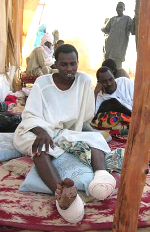HRW wants donors to address reported atrocities in Darfur
DAKAR, Senegal, Sep 27, 2004 (PANA) — Donor governments gathering Monday in Oslo, Norway to discuss humanitarian needs in Sudan’s troubled western region of Darfur should also take steps
to end the serious human rights abuses responsible for
the crisis, Human Rights Watch (HRW) said.
 The New York-based rights group said in a statement the
The New York-based rights group said in a statement the
donors should also pledge support for civilian protection
under an expanded African Union (AU) mission in Darfur.
The AU was mandated under an April 2004 ceasefire
agreement signed by the Sudanese government and the
two Darfur rebel groups to monitor the ceasefire in
Darfur.
Some 154 AU ceasefire monitors of different nationalities
have been deployed to the area, protected by 310 AU forces
from Rwanda and Nigeria.
“If donor governments are serious about putting an end to
the violence in Darfur, they have to address the atrocities
fuelling the crisis as well as the humanitarian consequences,”
said Peter Takirambudde, executive director of Human Rights
Watch’s Africa Division. “Without greater international
support for the African Union intervention, the violence
in Darfur will continue.”
The AU has offered, and the UN Secretary General has
recommended, that the mandate of the AU be expanded to
include civilian protection, and that the numbers of forces
be increased.
The AU suggests 3,000 military forces and 1,200 civilian
police and the Secretary General has called on UN members
to support the AU mission with technical and financial
contributions.
The Sudanese government, however, has not agreed to an
expansion of the African Union’s mandate or its forces.
HRW said diplomatic pressure “is urgently needed” on the
Khartoum government to welcome the expansion of the
AU mission.
It said “another priority is funding for the establishment
of the international commission of inquiry, authorised by
the UN Security Council, to investigate the abuses in
Darfur.”
According to the rights group, wven with UN backing, donor
participation in fully staffing and equipping this body
would be vital.
It claimed that despite repeated pledges, the Sudanese
government has made no real effort to disarm the Janjaweed
militias.
HRW said its research has shown that “government forces
actually share camps with the Janjaweed and continue to
support the militias’ activities.”
“The government’s scorched-earth policies in Darfur led to
the displacement of hundreds of thousands of civilians, and
their numbers are increasing on a daily basis,” it charged.
According to the UN, there are some 1.45 million internally
displaced in Darfur.
“Donors should press Khartoum to allow international
humanitarian organisations greater access to provide
assistance and protection to the displaced population in
all areas, whether under government or rebel control,” HRW
said.
It also expressed concern “that the creation of ‘safe
areas’ agreed to by the Sudanese government and the United
Nations in early August, has already led to military clashes
between the Sudanese government troops and rebels who were not
consulted on the ‘safe area’ proposal.”
“Donor governments need to ensure that experts on sexual
violence in armed conflict are deployed in the monitoring
teams of the AU and the Office of the High Commissioner for
Human Rights, and that all military and civilian units charged
with protective and monitoring roles receive proper training in
observation, investigation and recording of abuses,” HRW said.
It also expressed concern about the Memorandum of Understanding
entered into between Sudan, the United Nations and the
International Organisation of Migration (IOM) on August 21
on the voluntary return of the internally displaced in
Darfur.
“The memorandum lacks important fundamental legal standards,
a provision for the independent monitoring of conditions for
the displaced after return, and provisions related to
enforcement and accountability,” the rights group claimed.
“Moreover, the IOM itself lacks the mandate, expertise or
capacity to carry out its obligations under this memorandum.
“As they consider funding requests related to the return of
displaced persons, donor governments need to raise these
concerns. They must ensure that the voluntary and safe return
of the displaced is conducted in co-ordination with appropriate
UN and non-governmental organisations,” HRW added.
